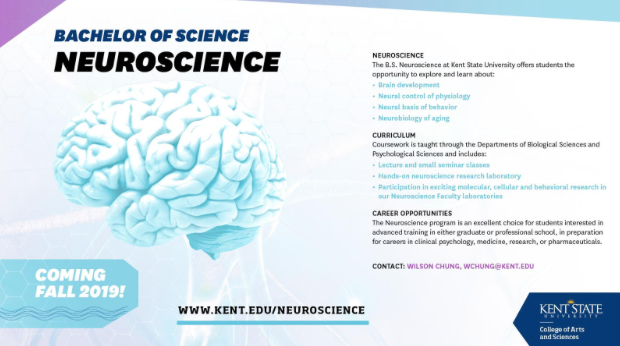Neuroscience degree offered beginning Fall 2019
November 1, 2018
The College of Arts and Sciences will begin offering a bachelor’s degree in neuroscience in Fall 2019.
Expanding the neuroscience program has been one of university’s goals for over 25 years, James Blank, the dean of the College of Arts and Sciences, said.
“Years back, as we decided where we wanted to focus in research and education, neuroscience was one of those areas,” Blank said.
The program gradually developed over the last 15 years as the university began to hire more neuroscientists, particularly in the departments of psychology and biological sciences.
With around 25 neuroscientists, the program now has a large enough faculty to offer the bachelor’s degree, Wilson Chung, an associate professor in the department of biological sciences, said.
“We now have a critical mass of people who can teach and study and talk about neuroscience as a whole,” Chung said.
The curriculum will consist of lecture classes and seminars, as well as hands-on research experiences, according to the university website.
The university already offers a graduate degree in neuroscience, but having an undergraduate degree will provide more opportunities to students interested in science-related careers, Blank said.
“We decided that this would be a really good opportunity for students that might want to go into research careers or to medical school or other pathways leading onto careers in science,” Blank said.
Neuroscience is a scientific discipline that focuses on the brain and the nervous system.
Using elements of different scientific fields, such as psychology, chemistry and biology, neuroscientists aim to learn information about the functions and processes of the brain, Chung said.
“We study all the processes that control how the brain is made, how the brain functions, how neurons function and how they can go wrong,” Chung said.
The number of students enrolling in the program in Fall 2019 is not yet known, but based on other neuroscience programs he researched, Chung expects between 30 to 50 students.
Additionally, Chung believes the program will experience “rapid growth” during its first several years as the discipline continues to take on a greater role in society.
“Neuroscience is not just the study of the biology of the brain,” Chung said. “It’s also the study of the psychology of the brain. By knowing how cognition, behavior and brain function work, we can actually use those things to organize society better.”
Paige Bennett is the sciences reporter. Contact her at [email protected].












